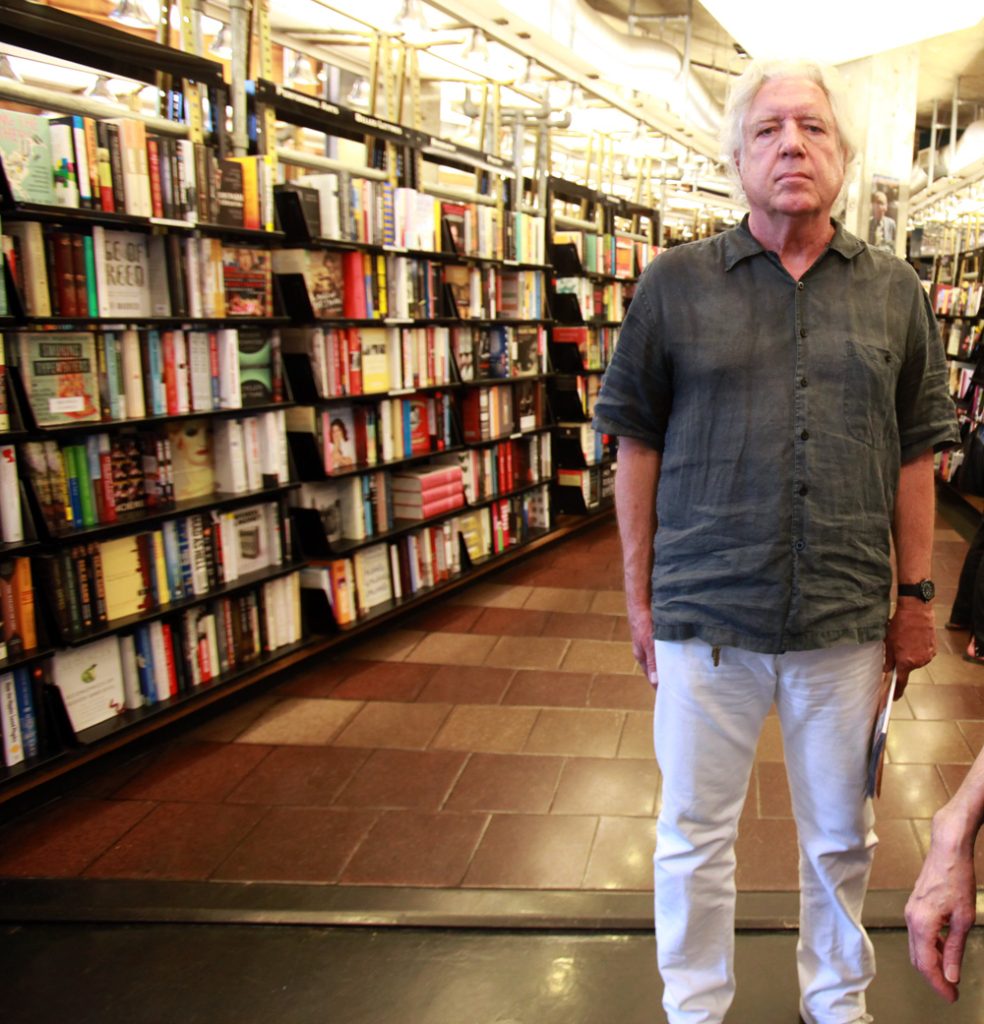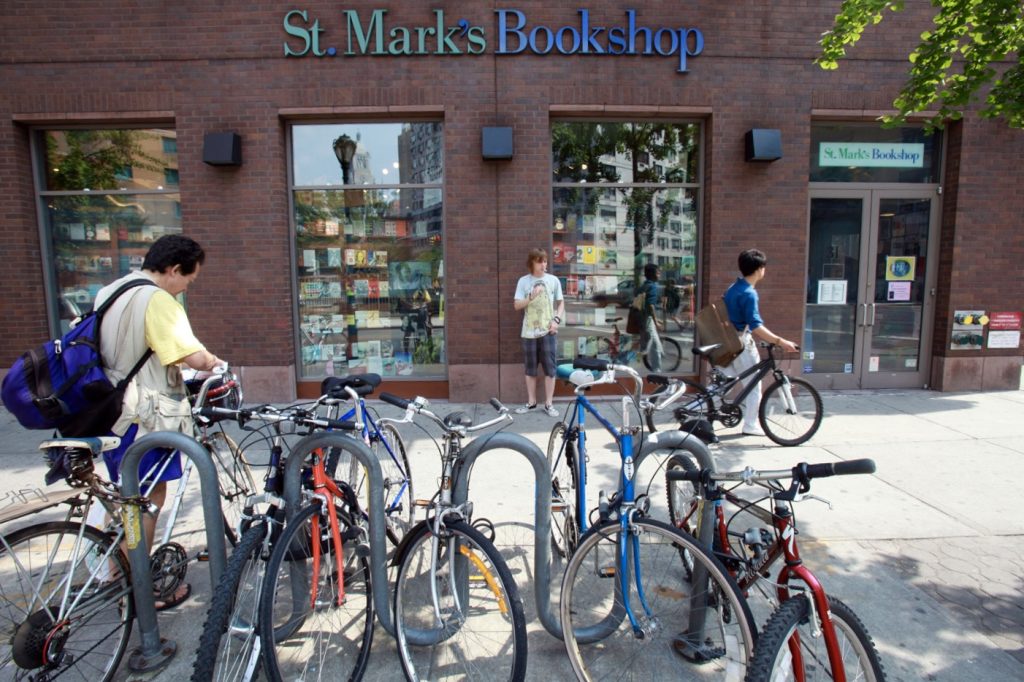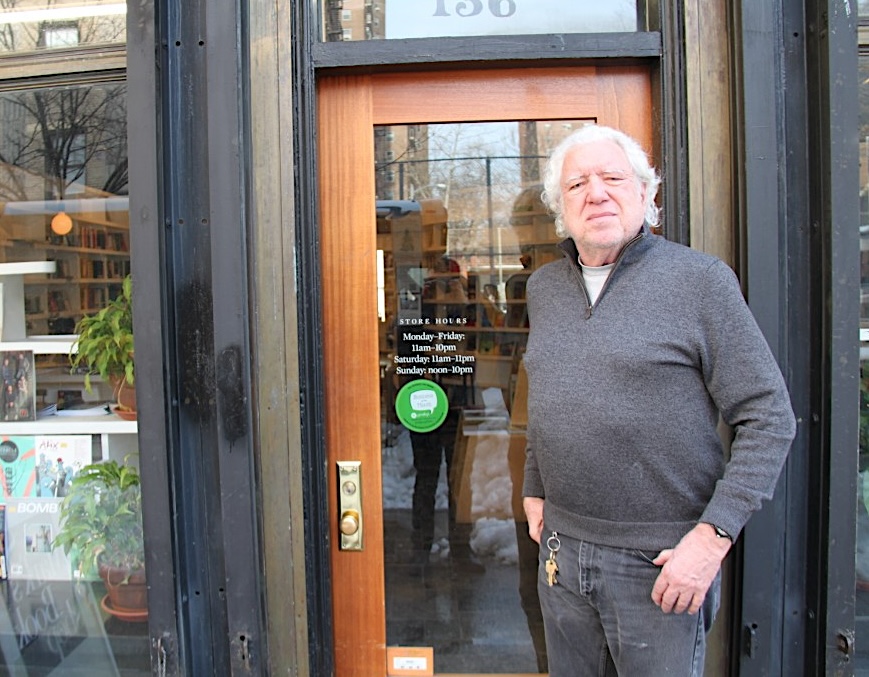BY LINCOLN ANDERSON | Updated Nov. 12, 11:40 p.m.: Bob Contant, the co-owner of the former St. Mark’s Bookshop, died on Mon., Nov. 6. He was 80.
Bridget Marmion, a friend and book marketer, posted on Facebook that Contant died due to cardiac arrest after a bout of a few days with COVID.
His wife, Marilyn (M.D.) Berkman, who is a poet, said that Contant also had been experiencing difficulties following knee replacement two years earlier.
Contant lived in Gramercy.
Writer Ron Kolm, who has worked in Manhattan bookshops for more than 50 years, was a staffer at St. Mark’s Bookshop in its early incarnations. Kolm recently chronicled some of his experiences in “The Bookstore Book: A Memoir.” Contant is mentioned in one of its chapters.
Kolm said that in the mid-1970s, Contant was one of a group of four managers — the others included Terry McCoy and Peter Dargis — who ran the East Side Bookstore, at 34 St. Mark’s Place, between Second and Third Avenues. The street “had a lot of bookshops” back then, Kolm recalled. Contant and McCoy had also previously worked at 8th Street Books, where Contant had been a manager.
At East Side Bookstore, Jim Rose was an absentee owner. Feeling they could do a better job themselves, Contant and the others struck out on their own and opened St. Mark’s Bookshop at 13 St. Mark’s Place across the street, on the north side of the block. In the early days, they didn’t take any pay for themselves since they all had other jobs, as well. But the store thrived and they added the basement, doubling their space.
They then relocated in 1987 to the more spacious 12 St. Mark’s Place, back on the southern side of the street, which is currently home to the new Village Works bookshop.
Then, in 1993, remaining partners Contant and McCoy were invited — with the backing of Rodale publishing — to relocate once again by The Cooper Union, which offered them a 20 percent rent reduction at the school’s new dormitory development at the former location of a hardware store at 31 Third Ave., at Stuyvesant Street, just south of Ninth Street, which today is home to The Bean coffeeshop.

With its distinctive exposed ductwork in the ceiling, the bookshop at 31 Third Ave. won awards for its architects and was featured in New York magazine.
The store is said to have done very well in the ’90s and 2000s. It was known for its art books, plus its curated selection of fiction, nonfiction and poetry, plus small press, literary journals and zines, tailored to neighborhood tastes, as well as critical theory. You could find on the same shelf, for example, a book of illustrations of Russian prison tattoos and the biography of John Joseph of the Cro-Mags, with a photo book on 1970s subway graffiti and other art books on a table nearby.
In a 2016 interview with Village Preservation, Contant said the store consciously made critical theory a niche for itself.
“Just on 8th Street alone, between 2nd Avenue and 6th Avenue there were about eight bookstores,” he said. “Bookstores in New York were like Starbucks are now, they were everywhere. To set ourselves apart, we focused on Post-Structuralist philosophy, we dedicated a section to it, and we developed a reputation for having critical theory books, which drew people from all over.”
The East Village literary landmark attracted high-profile customers, including the likes of Madonna and Susan Sontag, as well as cultural and literary figures, such as Patti Smith and Walter Abish.
However, the financial crisis and the rise of online book sales made a dent in the bottom line.
For his part, Contant, in the Village Preservation interview, also blamed mismanagement at The Cooper Union, noting the store’s struggles coincided with the school deciding it could no longer offer free tuition, plus its embarking on a major campaign to develop a new building Third Avenue.
“Cooper Union was building its dormitory building on the corner of 3rd Avenue and 9th [Street], and they solicited us to be their commercial tenant, and offered us a 15-year lease and a reduction in the rent we were paying,” Contant said in the 2016 interview. “So we moved in, and we had a very healthy relationship with Cooper Union for the extent of the lease. Maybe 5 years ago, the administration changed at CU and the people who we knew moved on. They weren’t there anymore and taking over was a group that was basically interested in real estate. They were a disaster, not only for the bookstore but for CU itself; they charged students tuition, which was in violation of CU’s charter, and they built the building without having a sponsor, so it put them in serious debt. Basically they mismanaged what they inherited to the extent that the Attorney General’s Office investigated them for financial reasons. As a result, they got us out by raising our rent. They wanted double what we were paying; we were paying in the neighborhood of $20,000/month in rent and they wanted over $40,000/month. We couldn’t afford it. Nobody could.”
In 2011 and ’12, a petition effort was made to get The Cooper Union to lower the Third Avenue store’s rent. A fundraising drive also netted the shop around $24,000. “Bowling for Columbine” filmmaker Michael Moore lent his name and presence to the cause, dropping in to give a talk at the store.
But, in the end, it wasn’t enough. By 2013 the lease had become prohibitively expensive. In early 2014, Contant and McCoy vacated the space.
St. Mark’s Bookshop reopened briefly in a commercial storefront in the New York City Housing Authority’s First Houses on E. Third Street between Avenue A and First Avenue. While the rent was “extremely reasonable,” Contant said, the quiet side-street location lacked the foot traffic of the busy Third Avenue strip.
After hanging on for a two-year run at the new spot, the store closed for good in early 2016.
Right around when the store shuttered for the last time, it was named the “Business of the Month” by Village Preservation.

Contant’s wife said he was always very much hands-on at the shop.
“Bookstores are made great by their buyers and curated selection and their welcoming of those interested in literature, art and intellectual inquiry into a community,” she said. “Bob was the principal buyer, as well as a co-owner. Years after the store closed, Bob would bump into former customers — or just browsers — who would thank him for having done just that.”
Contant also personally decided the “face-outs” — the books whose covers were displayed on the bookshelves — and the window display, she added.
After the store’s closing, Berkman said, “He kept up his interest in poetry, literature and literary/cultural figures and art, being an avid reader, although he would have much preferred continuing being an active part. He always enjoyed the fun of interacting with others.
“He had a wide knowledge and a keen appreciation that I was lucky enough to have shared,” she said. “I have lost half of my brain and all of my heart.”
Kolm called Contant definitely an influential operator in the New York City independent bookstore scene.
“He was a very powerful figure,” he said.
Bob Contant is survived by his wife, Marilyn (M.D.) Berkman, as well as a daughter, Daryl Prezioso, from a previous, brief first marriage, and two grandsons, who all live in Maryland, and a sister, Pamm Houchens, of Delaware, and two nephews.
In her Facebook post, Marmion said it’s likely that a memorial would be held at a later date.


I’m so sorry to hear this. I knew Bob from when I lived on Saint Marks Place. He was a great supporter of our Block Association and a supporter of my work as a writer. I was thrilled to read at the last location of the bookshop. My condolences to his wife, Marilyn.